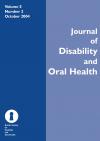Journal of Disability and Oral Health

- Cover Date:
- October 2004
- Print ISSN:
- 1470-8558
- Electronic ISSN:
- 1754-2758
- Vol:
- 5
- Issue:
- 2
Editorial
Good quality research and audit are vital to underpin clinical practice within the context of evidence-based care. Special Care Dentistry has been bedevilled by a lack of published research to endorse some of the clinical activity undertaken for people with disabilities, although as a clinical discipline, it is not alone in this. The British Society for Disability and Oral Health has endeavoured to address the issue of protocols for the care of people who come under the remit of Special Care Dentistry (SCD) by the development and publication of its series of Guidelines. Similarly, the Joint Advisory Committee for Special Care Dentistry has produced two very excellent documents - one on the case of need for a speciality and the other, a proposed training programme for someone intent on becoming a specialist in SCD. Both of these are available on the BSDH website: www.bsdh.org.uk. A brave person indeed you say, who is prepared to embark on a training programme in a specialty that is not officially recognised. Yet there are so many people out there providing high quality dental care for people who are impaired and disabled in some way and who have been shunned by more conventional dental care providers. Their dental team may have, as yet, no formal training pathway but they have, by dint of dedication and a sense of professional responsibility, acquired the skills and experience that has allowed them to care for such groups of people. Such is the case in the pages that follow. We read of the team of Lewis and Gilmour providing care that breaches the boundaries of the conventional primary: secondary care interface to provide consultant directed, experienced clinician-delivered care to people, close to their homes, whose only other option maybe to receive compromised, or no, care. Other teams, Tamura and Susuki, are developing novel techniques to overcome a very specific problem for the increasingly ageing members of society. Still others, Tsami et al., Terro et al. and Roman are using epidemiological tools with people with disabilities to gather data that enables them to bring political pressures to bear in order to improve services for disadvantaged groups. Whilst the dental politicians argue about the necessity for additional specialities, agonising over the recognition of Special Care Dentistry and what it might mean for their specialty, the evidence accrues on the needs and expectations of the ever-increasing number of disabled people who are excluded from accessing oral health care. Evidence that i s becoming overwhelming in its support for proper e d u c a t i o n and training for those people prepared to provide clinical care, often in difficult circumstances, that their more conventionally trained peers are either unwilling or unable to provide. Or maybe we just wait for the pressure to mount from parents and carers, and eventually the legislation that follows, to force us to do what any professional should have done a long time ago; acknowledge the needs of vulnerable people in our society and if they as clinicians are not prepared to provide the dental services, ensure that, within the framework of clinical governance, there is an opportunity for others to provide high quality care backed by appropriate skills acquisition and recognition of those skills. Is this just naive – or too uncomfortable a thought? June Nunn
- Article Price
- £15.00
- Institution Article Price
- £15.00
- Page Start
- 50
- Page End
- 50
- Authors
- June Nunn
Articles from this issue
- Title
- Pg. Start
- Pg. End
- Oral hygiene and periodontal treatment needs in young people with special needs attending a special school in Greece
- 57
- 64
- The oral health status of the Special Olympics Special Smiles (SOSS) athletes in the Middle East and North Africa Region
- 77
- 79
